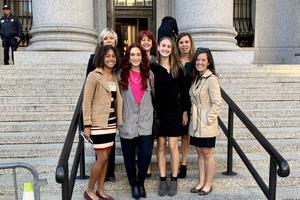Catholic School Sports Should Encourage Prayer
Catholic kids need and deserve the kind of athletic formation that upholds the dignity of the human person and gives glory to God.

Imagine losing your job, simply because you prayed after a sporting event.
That’s exactly what happened to Joseph Kennedy in Washington State — and it’s yet another example of hostility to Christianity in public schools.
Back in 2015, Kennedy lost his head football coaching job at Bremerton High School, because he refused to stop praying at the 50-yard line after games. Kennedy began the practice by offering a brief prayer of thanksgiving, and he was later voluntarily joined by players from both teams.
To defend his right “to act in accordance with his sincerely held religious beliefs,” Coach Kennedy has had to take his case all the way to the United States Supreme Court, which will hear his arguments in April. He has the support of the U.S. Catholic bishops, because his plight resembles the growing threats to the religious freedom of all Catholics and other religious believers who run afoul of secularism.
But while Kennedy is surely right to defend his job, there is a larger issue here: the inadequacy and growing danger of secular public education for Catholic families. With regard to school sports in particular, Catholic kids need and deserve the kind of athletic formation that upholds the dignity of the human person and gives glory to God. Public schools are by definition secular, therefore lacking complete understanding of education — and today, they are increasingly hostile to prayer and the truths of our Catholic faith.
Catholic schools and colleges should “ensure that public prayer is a part of each home pre-game program and encourage post-game team prayers as well,” explains The Cardinal Newman Society’s recently published “Policy Standards on Formation of the Human Person in Catholic School and College Sports.” By doing this, Catholic education not only differentiates itself from the myriad young people fleeing the praying field but also upholds its mission of seeking and teaching truth to its students. While academics is the primary means to achieve this, extracurricular programs are critically important for rounding out a students’ formation and instilling a Catholic worldview.
The standards anticipate objections and questions about the practices of Catholic school teams, quite similar to the concerns raised against Coach Kennedy. “Isn’t it a violation of good taste and religious freedom to offer a specifically Catholic prayer before a game? Shouldn’t we choose the most generic and universal sentiments to avoid offending others?”
Not at all! That’s what faithful Catholic educators should say. The home team plans its pre-game and post-game events, inviting others into its “home.” At a Catholic school or college, that’s a “Catholic home.” “We have a chance to show our guests who we are: a community of faith and part of the Catholic Church, and in this instance the Church at play and prayer,” explain The Cardinal Newman Society standards.
Moreover, “We should never shy away from the name of Jesus in any prayer or circumstance out of a false sense of inclusivity or a fear of appearing pious.”
Coach Kennedy, not a Catholic but a lover of Christ, gives us a model of fortitude in an age of weakness. His strength is no less important to sports than physical strength. He was not afraid of offering a public prayer of thanksgiving following a football game, even though it ultimately cost him his job.
Likewise, coaches at Catholic schools and colleges should not hesitate to offer prayers before or after sporting events. Neither should students. They should never shy away from showing their firm belief in Jesus Christ, knowing that their example on and off the field is welcomed and celebrated — part of Catholic education’s key role in the Church’s mission of evangelization.















